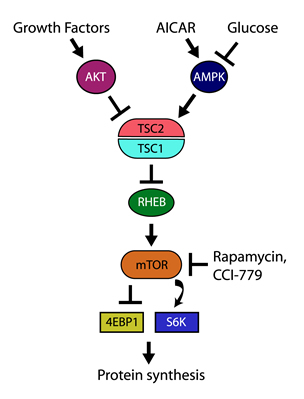Mechanisms Underlying Long Term Memory
| Select a project below to learn more: |
|
| Mechanisms Underlying Working Memory |
|
 The hippocampus, a structure in the temporal lobe, has been shown to be critical for the formation and storage of long-term memory. Recently, our laboratory has been focusing on the role the TSC-mTOR cascade, a pathway that integrates growth and nutritional signals to regulate the protein synthesis required for cell growth. Our laboratory has shown that long-term memory formation can be disrupted by targeting the hippocampus with rapamycin, a specific mTOR inhibitor. Furthermore, we have shown that the memory enhancing properties of centrally-applied glucose are due, in part, to increased mTOR activity. In addition to the hippocampus, we have shown that certain types of long-term memory are stored within the prefrontal cortex. This storage occurs as a direct result of training, challenging the notion that long-term memory storage occurs first in the hippocampus, followed by a transfer of this memory to the neocortex. We are currently examining the contribution of various components of the TSC-mTOR cascade to long-term memory formation.
The hippocampus, a structure in the temporal lobe, has been shown to be critical for the formation and storage of long-term memory. Recently, our laboratory has been focusing on the role the TSC-mTOR cascade, a pathway that integrates growth and nutritional signals to regulate the protein synthesis required for cell growth. Our laboratory has shown that long-term memory formation can be disrupted by targeting the hippocampus with rapamycin, a specific mTOR inhibitor. Furthermore, we have shown that the memory enhancing properties of centrally-applied glucose are due, in part, to increased mTOR activity. In addition to the hippocampus, we have shown that certain types of long-term memory are stored within the prefrontal cortex. This storage occurs as a direct result of training, challenging the notion that long-term memory storage occurs first in the hippocampus, followed by a transfer of this memory to the neocortex. We are currently examining the contribution of various components of the TSC-mTOR cascade to long-term memory formation.
